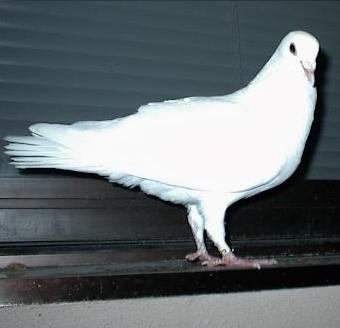
I listened to a story on the radio the other day about the avian flu
in Turkey. It mentioned some little girls who stood by, unhappily,
as their pet chickens were loaded into bags to be killed. Although
poultry is eaten and kept for eggs, the birds aren’t generally viewed
the same way in Turkey and China as they are here. Kids in those
countries play with them, hold them, pet them and give them
names, as we would a dog or cat.
It may be hard for some Americans to take seriously the concept of
a pet chicken, but I think most of us know that children can make a
pet out of almost any animal. Birds respond to interaction with
humans. Some birds actively seek out their human companions.
When I was seventeen, I had a pet tom turkey for about a year.
He was the only poult to survive out of a brood of a hundred my
father bought, obviously a failed venture. The tom lived in a
doghouse by our calf pen and clearly recognized me, probably
because I was the one who fed him. Whenever I walked outside,
he would come out of the dog house and spread his splendid tail
feathers, puffing up his back and chest until he looked twice his
actual size. “That turkey’s in love with you,” observed my
stepbrother, wryly. I moved back to Oklahoma, away from my
father’s farm, in September that year and was thus spared having
to participate in the tom’s inevitable Thanksgiving fate.
Although the subject of the girls in the avian flu story wasn’t
the reporter’s main thrust, I found myself unable to stop thinking
about them and their chickens. What was it about these little girls,
powerless to halt the killing of seemingly healthy pets, that
bothered me so?
And then it all came back to me.
When Danny and I were kids, our father kept a number of racing
pigeons. He was in a racing club and a lot of money changed
hands over bets on the races. Some of the races were 500 miles
long, and some of the birds were worth quite a bit of money.
Danny and I were intimately involved in their care. We fed and
watered them. We cleaned the cage. We shooed the birds away
from landing on the cage, so that they would stay in the air and
exercise. I held them while my father sewed up their wounds
and gave them shots of penicillin when they were injured by
a high wire.
Danny and I named our favorite pigeons. The ones that stand
out in my memory are those that we named first – a male, pale
grey with silver bars on his wings, and a female, white with
splashes of dark grey all over her body. They were “Silver”
and “Splash.” We were ecstatic when our father decided to
breed them. I don’t know if he did this because they were
our favorites, or if it was a happy coincidence, but, from my
9-year-old point of view, the pairing seemed more romantic
than Camelot. Silver and Splash hatched an ordinary-looking
lump of fat which pooped copiously and was covered with fuzz.
We christened him “Screaming Baby.” All young pigeons scream,
but he seemed to scream especially loud to us, hence the name.
One should take a moment to appreciate the budding creativity
that these descriptive names evidenced. (Cameryn seems to
have excelled over us; her favorite stuffed monkey, black
but for face, hands and feet, is referred to as “Blackamostly.”)
Looking back, I realize now that Screaming Baby probably
screamed louder than the other squabs because we were
forever handling him. We played with Screaming Baby all
the time. Before he was able to fly, we put him on the gear
teeth of our father’s cement mixer while it was running, a la
treadmill. It wasn’t as dangerous as it sounds.
Our father wasn’t a stable person, to say the least. Without
trying to diagnose him, I will sum him up for the purpose
of this story by simply saying that he was given to unpredictable
rages. Danny and I did the best we could to find normal
childhood moments together among the daily frightening and
violent events that made up our young lives.
One night, just after falling asleep in my pink and white room
across from Danny’s blue and red one, I found myself suddenly
awake, heart beating hard, limbs shaking. The tone of my
mother’s voice, frightened and breathless, had forcefully pulled
me out of my dream.
“What’s wrong?”
“I killed them.”
“What?”
“I killed them all.”
“All the pigeons?”
“Yes. I pulled off their heads.”
“Why? What happened?”
“I don’t know. I don’t know why.”
“Even Silver and Splash?!”
“All of them.”
I cried, silently, in my bed. They were gone.
My father had a heart attack the next day. Mom
believed that this was, somehow, why he did it, but
I didn’t buy it then and I don’t buy it now. He did things
like that all the time. He did it because it’s just what he
did. The pigeons were small things, much smaller and
more fragile, more defenseless, than even a 9-year-old
child. My father was a tornado. A hurricane. A terrible,
destructive force of nature. You don’t ask a tornado why
it kills. It would be futile.
Those little Turkish girls clearly understand this.
You can scream into the wind all you want, but it will
never hear you.

1 comment:
Cindy,
Even if I had not experienced this, I would be very extemely moved by your description.
Knowing some of the things that happened to your dad that may have caused him to be the way he was doesn't lessen the impact of this experience on a kid.
Great writing.
Mom
Post a Comment